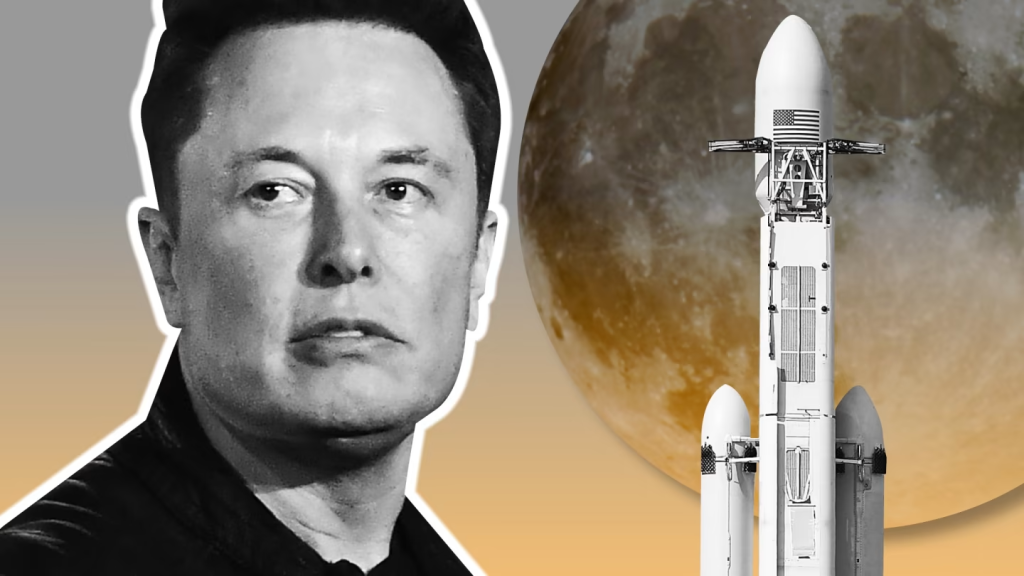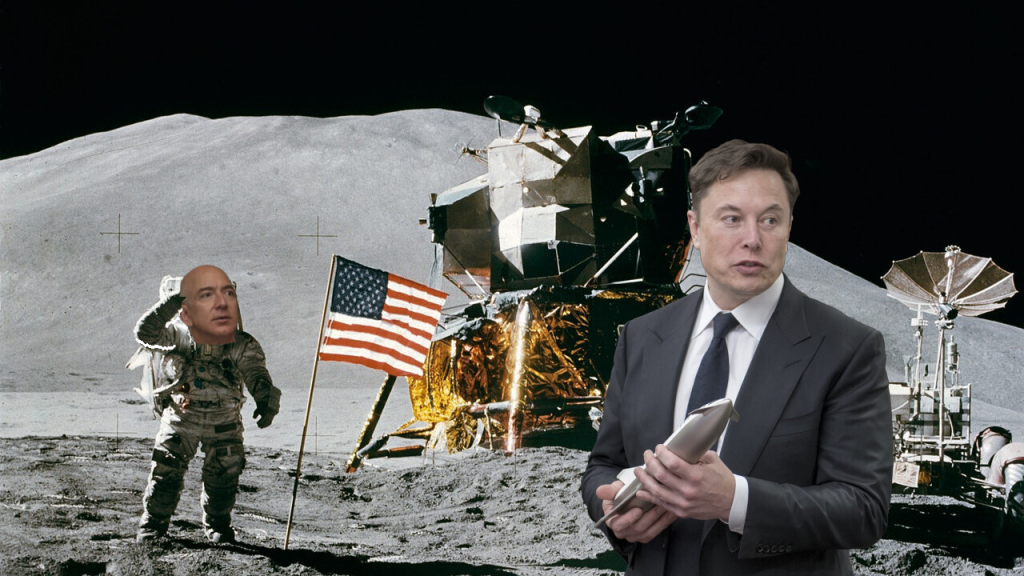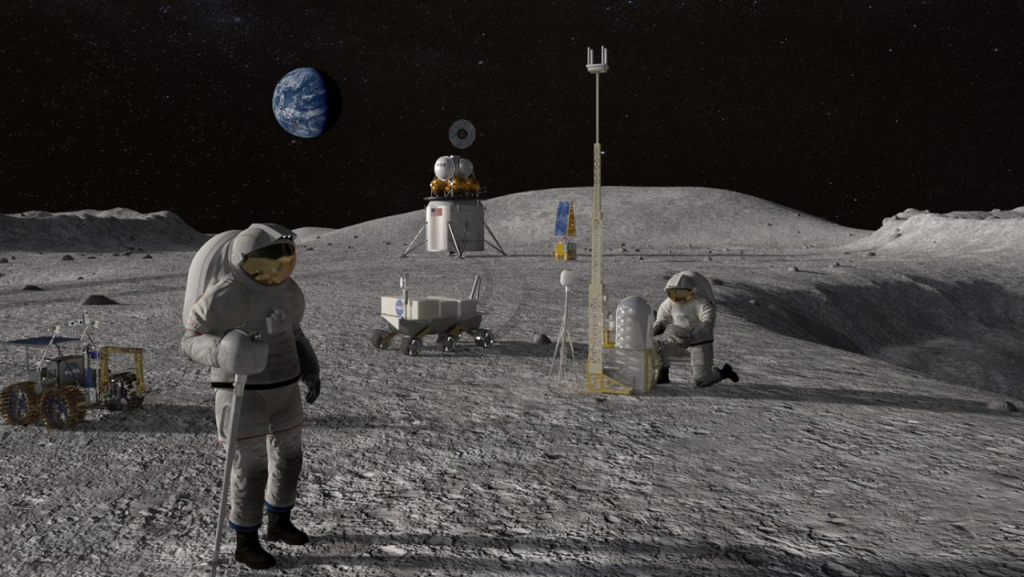
Washington D.C. — In what observers are calling a seismic shift in the battle for space supremacy, the incoming head of NASA, aerospace veteran and former quantum propulsion theorist Dr. Leona Myles, made global headlines this morning after issuing a direct and defiant challenge to the spacefaring empire of Elon Musk.During her inaugural address at the Kennedy Space Center, Dr. Myles boldly declared NASA’s return to the Moon not just as a scientific milestone, but as a message to those who, in her words, “seek to privatize humanity’s final frontier for ego and empire.”With unshakable confidence and a commanding voice that echoed through the packed auditorium of journalists, engineers, and star-eyed interns, Dr. Myles unveiled Project Prometheus, an unprecedented lunar program with a budget valuation exceeding ten quadrillion dollars, instantly making it the most ambitious government-funded project in human history.She stared directly into the cameras, paused, and said,”We will return to the Moon not as renters, not as tourists, and certainly not as spectators. We will return as the rightful heirs of human destiny beyond Earth.”The statement instantly reverberated through every corner of the space industry. Social media erupted, world leaders responded, and most notably, Elon Musk himself fired off a cryptic three-word post on X that read, “Too little, too late.”But this was not the first time NASA had been caught in Musk’s shadow. Over the past decade, Musk’s SpaceX had effectively outpaced, out-innovated, and outperformed the aging government agency on nearly every metric imaginable.From Mars simulations to low-orbit cargo runs to lunar test landings, SpaceX had become the name the public associated with space. NASA had become, in the eyes of many, a relic — a museum of Cold War dreams, bloated bureaucracy, and PowerPoint ambitions.Until now.

Dr. Leona Myles is not a conventional bureaucrat. She is known within the aerospace community as “The Architect,” a nickname earned during her tenure at DARPA where she designed the first adaptive propulsion grid capable of real-time quantum-state fuel conversion.At MIT, she lectured on the philosophical ethics of AI-piloted deep-space navigation. In private, she was rumored to have declined three separate offers from Musk himself to join SpaceX’s Martian colonization team. When asked why she refused the invitations, her reply was simple.”I’m not here to follow a billionaire’s vision. I’m here to challenge it.”Her arrival at NASA comes at a time when public trust in government-led space exploration is at an all-time low. While Musk’s rockets landed upright on autonomous barges and his AI chatbots casually discussed orbital mining, NASA had faced years of stalled launches, budget hearings, and hollow political promises about a lunar return that never materialized.Yet now, Dr. Myles has reignited the flame, not with nostalgia, but with a new doctrine that she called sovereign space democracy.In her own words,”We cannot allow the universe to be colonized by commerce alone. Space must be a shared inheritance, not a corporate subdivision.”Project Prometheus, as outlined in the briefing that followed her speech, is not a single rocket or a solo moonshot. It is a full-scale lunar ecosystem designed to support multi-generational habitation, experimental fusion energy reactors, AI-governed ecological domes, and the first quantum-time relay designed to bend relativistic lag in deep-space communication.At its center will be Helios Alpha, the first permanent lunar capital built not from imported parts, but from lunar-regolith-processed smart materials forged by autonomous printers.This vision stunned even those who had grown tired of NASA’s long history of overpromising and underdelivering. Dr. Myles, however, was unapologetic.”This is not the Moon of 1969. This is the Moon of 2069, arriving early.”

When asked about the staggering budget — over ten quadrillion dollars in projected total costs over thirty years — she didn’t blink. She simply replied,”If we’re willing to spend ten quadrillion simulating our lives online, surely we can invest that same number in reclaiming the stars.”The challenge to Musk could not be more explicit. For years, he had positioned himself as the de facto commander of Earth’s expansion into the cosmos. With SpaceX, Neuralink, Starlink, and xAI working in seamless harmony, he had created what some called the first Earth-bound space empire. His moon bases were already being built under private treaties with micronations.His Mars timeline, despite setbacks, remained a few years ahead of any public competitor. And his influence — over media, over finance, over the cultural imagination — was absolute.Until now, no one had dared to openly oppose him.But Dr. Myles, with the full institutional power of NASA and the silent backing of several global coalitions, is not just opposing. She’s rewriting the game.Behind closed doors, sources have confirmed that Project Prometheus is already receiving black-budget-level funding from strategic allies in Europe, Southeast Asia, and even rogue factions of the Global South.The project’s propulsion system, nicknamed Vortex Halo, is rumored to rely on a prototype quantum vacuum ignition model — something Musk himself once joked was impossible on Earth. Yet blueprints show that NASA’s prototype V-Halo drive has already passed two simulations that outclass anything SpaceX has demonstrated in public.A senior official within the Prometheus division was quoted anonymously saying,”This isn’t about beating Musk to the Moon. This is about reminding the world that public purpose can still lead where profit has paved the road.”Reactions from SpaceX have been predictably theatrical. Musk reportedly called an emergency meeting at his Starbase facility shortly after the Myles speech. Engineers close to the room say that Musk was unusually silent for most of the meeting, pacing back and forth before sketching an inverted lunar dome on a digital whiteboard and saying,

“If they want a Moon war, we’ll give them one. But we’ll do it smarter, faster, and with a view of Mars.”The rivalry has only added fuel to an already growing ideological divide between the privatized future of space and its democratic counterpart. For many, this is not just a race to the Moon. It is a war of philosophies.One led by a man who believes in speed, disruption, and personal empire. Another led by a woman who believes in order, collaboration, and reclaiming public trust in what she calls the sacred obligation of exploration.As the world watches, the stakes could not be higher.If Dr. Leona Myles succeeds, she will not only restore NASA’s credibility, but redefine humanity’s next era of interplanetary existence. If she fails, Musk’s dominance will become irreversible, and the stars themselves may belong not to civilization, but to the one who reached them first.For now, both sides prepare in silence.In the dark vacuum beyond Earth’s sky, the Moon waits, ancient and unmoved.And the countdown has begun.


